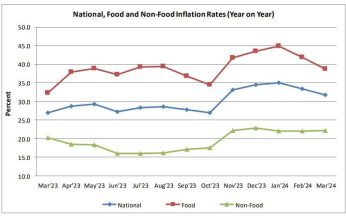Cama worried with minibus fares, water tariff rises
Consumer Association of Malawi (Cama) has said businesspeople are taking advantage of government’s weakness to hike minibus fares, water tariffs and prices of goods and services without regard for the consumers’ welfare.
Cama executive director John Kapito was reacting to a 10 percent hike in minibus fares and a 39 percent increase in water tariffs announced by Blantyre Water Board (BWB) on Monday.
“This is hurting us badly, I wish we had a listening government that could intervene before things get out of hand,†he said.
Kapito also observed that the 10 percent increase in minibus fares is the whole increase effected on petroleum products and wondered whether the only cost for running minibuses is fuel.
“Our understanding was that the 11 percent increase on fuel should have been taken as one of the inputs in running a minibus and a margin of four percent was a realistic percentage for any transport increase.
“This is the reason we questioned and requested government to ensure that the market is monitored continuously to ensure that both traders and consumers’ interests are protected at all times. But it seems no one is interested in challenges traders and consumers are experiencing. This is a huge cost on government and leadership.
“Malawians have lost trust in the current leadership because it lacks general understanding of their challenges. Unfortunately, because of weaknesses displayed by government, businesses have taken advantage to hike minibus fares, water tariffs and prices of various goods and services,†he said.
Fuel price hike
Justifying the 10 percent minibus fare hike, Minibus Owners Association of Malawi (Moam) general secretary Coaxley Kamange said they took into account the rise in prices of fuel, tyres and insurance premiums to come up with the fare.
“The spare tyres which previously cost K15 000 [about $60] are now at K50 000 [about $200], a five litre gallon of oil now costs between K10 000 [about $40] and K15 000. So, considering all these things, we had no choice but to raise the fares. We have done this to remain in business and to keep our minibuses in good running condition,†he said.
Kapito said it is sad the rise in water tariffs has happened at the time when the disposable income of most Malawians has dwindled because of the devaluation of the kwacha and its further softening after flotation.
He said the rise in prices of goods does not tarry with salary increases government is proposing for civil servants.
He said it is shocking to note that water tariff was raised effective August 1 2012 when legally people were supposed to know before the rise.
“There is need for a notice period and at the same time allow consumers to have a say on the reasons for increments. Water is one of the basic commodities government must ensure that it is affordable and accessible by all people. So, high tariffs in an economy where incomes are already down, makes one believe that the State has lost its moral social responsibility,†said Kapito.
Water tariff increase
BWB spokesperson Innocent Mbvundula said on Monday that the 39 percent upward tariff adjustment is an average and that some categories have a lower tariff increase.
Mbvundula justified the new tariff structure, arguing it is based on the general cost of water production and other associated services, including transport, cost of treatment chemicals and electricity.
“This increase has taken into consideration these factors and the need to ensure continuous water production and supply to our customers. You might wish to know that electricity cost alone has gone up and we are now paying about K123 million every month, up from about K80 million that we were paying previously. The cost of inputs has also risen and most of the inputs like chemicals, spares, meters and others are imported.
“In addition, most of our work is field-based and we use a tremendous amount of fuel and as you know, the prices of fuel have gone up several times since October 2011 when the tariff was last effected. So, generally, this 39 percent is the minimum increase that we could have effected to ensure continuity of water supply to our customers,†argued Mbvundula.
He also said the tariff adjustment has considered ordinary consumers by effecting an increase of 20 percent only.
“So, tariff adjustment for domestic consumers and those that draw water from communal water points [commonly known as water kiosks] in low income areas is 20 percent only so that they do not feel a huge impact in their quest to get affordable and quality water services,†he said.





